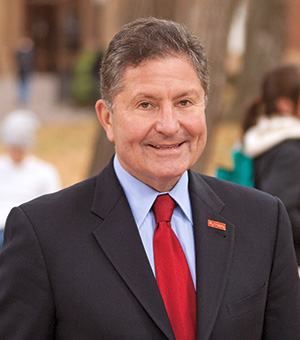Richard L. McCormick
Rutgers President, 2002 to 2012

Born in New Brunswick in 1947, Richard L. McCormick had a lifelong connection to the university. His mother, Katheryne Levis McCormick, was a longtime Rutgers administrator, and his father, Richard P. McCormick, was a celebrated Rutgers professor and author of Rutgers: A Bicentennial History. As the younger McCormick would later write, “Rutgers is my home. I was born only a few blocks away and spent countless hours wandering through campus walkways and corridors as a child reared by parents who spent their careers loving and caring for Rutgers.” After earning a B.A. in American studies from Amherst College in 1969 and a Ph.D. in history from Yale University in 1976, Dr. McCormick joined the Department of History at Rutgers–New Brunswick as an assistant professor. The author of three books and numerous articles, Dr. McCormick earned fellowships from the John Simon Guggenheim Memorial Foundation and the Woodrow Wilson International Center for Scholars. He rose to full professor and department chair, and served as dean of the Faculty of Arts and Sciences at Rutgers–New Brunswick.
His inauguration as president signaled his ambitions for the university. “Our most important goal is to move Rutgers to the top tier of America’s public research universities,” Dr. McCormick said in his inaugural address. “Imagine a university where most undergraduates, as well as graduate and professional students, are engaged in research or other forms of experiential learning, where teaching and research are inherently interdisciplinary, and where the boundaries between the institution and the rest of society are blurred almost to the point of invisibility. Together we can make this dream a reality. Together we can move Rutgers to the place of distinction that should be occupied by The State University of New Jersey.”
Rutgers is my home. I was born only a few blocks away and spent countless hours wandering through campus walkways and corridors as a child reared by parents who spent their careers loving and caring for Rutgers.
Richard L. McCormick
Under Dr. McCormick’s leadership, Rutgers largely achieved those goals during a time of historic accomplishment and visibility for the university. Adopting the university tagline “Jersey Roots, Global Reach,” his ambitions for Rutgers included an enriched learning experience for every student; teaching and research focused on global human problems; diversity of students, faculty, staff, and programs; and deeper connections with the people of New Jersey. He promoted strategically selected interdisciplinary research initiatives in advanced materials and devices, nanotechnology, transportation, nutrition, homeland security, stem cell research, climate change and renewable energy, and global and international studies. He also oversaw a successful campaign to strengthen the Rutgers brand through a common visual identity and marketing on billboards, campus banners, electronic media, and licensed apparel.
Innovations were a hallmark of Dr. McCormick’s tenure, most notably a major restructuring and reinvigoration of undergraduate education on the university’s largest campus. The far-reaching changes included combining four separate liberal arts colleges into a single School of Arts and Sciences, thus unifying admissions and graduation standards and enabling students to live anywhere and take advantage of any program or service at Rutgers–New Brunswick. The plan, initiated with a task force in 2004 and approved in 2006, reconnected the New Brunswick faculty to the work of undergraduate education and offered Rutgers undergraduates equal access to the university’s high-quality academic programs, participation in the intellectual work that characterizes the university, and access to learning communities of students with similar interests. Among the programs developed under this reorganization was the Byrne Family First-Year Seminar Program, which offers more than 100 courses—each with no more than 20 students—on a wide range of topics taught by top faculty. Related initiatives established under Dr. McCormick include the Aresty Research Center for Undergraduates and the Office for the Promotion of Women in Science, Engineering, and Mathematics.
Over his tenure, Dr. McCormick worked to strengthen Rutgers’ relationship with New Jersey’s leaders, businesses, and citizens. In response to the economic recession, he announced Rutgers Against Hunger in 2008, an initiative to stock food banks in the state, provide consumer education on nutrition, and help community organizations fight hunger. He established the first-ever Rutgers Day in 2009, inviting the public to a daylong event showcasing the university’s academic, research, cultural, and recreational programs. And as service members returned from Iraq and Afghanistan, he expanded the university’s commitment to veterans, including coordinators of veterans’ services on each campus, a dedicated website, and a veteran mentors program.
Advancing Rutgers' stature as a forum for diverse ideas and discussions of cultural awareness in a global society, in 2005 Dr. McCormick hosted the visit of the 14th Dalai Lama, Tenzin Gyatso, who spoke to the crowd of 36,000 at Rutgers Stadium about Peace, War, and Reconciliation followed by a question and answer discussion.
In 2007, Dr. McCormick announced a series of initiatives to strengthen diversity at Rutgers. Its components included establishment of a President’s Council on Institutional Diversity and Equity, a cluster-hiring initiative, and a national conference on diversity in higher education hosted by Rutgers. Along with these efforts, Dr. McCormick launched the Rutgers Future Scholars program, a pilot project to encourage minority and low-income teenagers from the university’s host municipalities of Camden, Newark, New Brunswick, and Piscataway to pursue higher education by offering mentorship and college preparation support, and the promise of free tuition to those admitted to Rutgers.
A number of milestones were achieved at Rutgers during Dr. McCormick’s tenure, including the establishment of Rutgers’ first-ever universitywide alumni body, the Rutgers University Alumni Association. In 2007, Dr. McCormick helped the university surpass $100 million in annual giving for the first time in its history.
Also in 2007, Rutgers–Camden established its initial doctoral-level academic program: a Ph.D. in childhood studies, the first in the nation in this emerging discipline. Dr. McCormick supported a major expansion of Rutgers School of Law–Camden, including a new, state-of-the-art law school building and renovation of the existing facility. He also has supported growth in computational biology at Rutgers–Camden.
With the founding of the School of Public Affairs and Administration in 2006, Rutgers–Newark opened its first new school in more than three decades. In 2006, Rutgers–Newark also expanded its teaching and research capacity by opening a Life Sciences Center and welcomed students to University Square, its first new residence hall in 16 years.
Dr. McCormick advanced a vision to reshape the university’s Livingston Campus in Piscataway as the home of business and professional studies. On that campus, the university built a new dining hall and dramatically renovated student center and was set to open a new apartment-style residence hall complex for 1,500 students in fall 2012. Construction was under way on a new business school building.
In 2010, under Dr. McCormick’s leadership and with faculty input, the Rutgers University Foundation announced the public phase of a fundraising campaign, Our Rutgers, Our Future, with a $1 billion goal.
In 2011, Dr. McCormick announced his decision to step down from the presidency and return to the faculty at the end of the 2011–2012 academic year. “With important accomplishments behind us, and a bounty of opportunities ahead, I believe that Rutgers today is stronger than ever,” he wrote in a letter to the Rutgers community. At commencement in 2012, Dr. McCormick received an honorary doctor of laws degree in recognition of his contributions as president and his distinguished service to the university and the state of New Jersey. The Board of Governors bestowed twin honors on Dr. McCormick at the end of the 2011–2012 academic year with resolutions naming him President Emeritus and Board of Governors Professor of History and Education.
As Dr. McCormick prepared to complete his presidency at the end of June 2012, Rutgers entered into a transformative period when the New Jersey legislature passed historic legislation to reshape higher education in the state and integrate into Rutgers all the units of the University of Medicine and Dentistry of New Jersey in New Brunswick and Newark (except University Hospital) while preserving Rutgers’ presence in Camden. When he left office, the legislation still required the governor’s signature and the approval of the Rutgers Board of Governors and Board of Trustees. In one of his last messages as the university’s leader, Dr. McCormick, a strong advocate for the integration of an academic medical center into Rutgers, wrote, “it is, of course, my strong hope that the boards will approve the plan and thus usher Rutgers into a new era of prominence . . . poised to become one of America’s preeminent public research universities, with statewide presence and national impact.”

